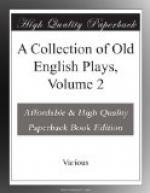Both similes occur in almost all Massinger’s plays.
The situation on page 219 has a striking resemblance to a similar scene with Cranmer in Henry VIII. Both Maurice and Cranmer are to be disgraced by being kept waiting outside while their enemies were at Council. I cannot help here repeating what I have expressed before, that Henry VIII. as we have it is not the work of Shakespeare and Fletcher, but of Massinger and Fletcher, with only fragments of the Shakespeare play.
Act I. Scene 3, is by Fletcher.
Act II. Scene 1, is by Massinger.
On page 231 we have,—
When
the hot lyon’s breath
Burns up the fields.
Compare Parliament of Love, I. 5., Montrose,—
When the hot lion’s breath singeth the fields.
A little lower down, “At all parts” occurs
in almost every play of
Massinger.
On page 232, “This I foresaw,” is also very common in similar situations. Among numerous cases I refer to the Unnatural Combat, Act III., about the end, and Maid of Honour, II. iii., where exactly the same words are used.
Page 233, “Be ne’er remembered,”
occurs in almost all Massinger’s plays.
It is the most frequent of his many repetitions.
A little lower down. “And something there
I’ll do,” is a well-known
Massingerism, occurring everywhere in his plays.
II. 2, is by Fletcher; 3, and 4, 5, 6, 7 are also probably his.
III. 1, is Fletcher’s. On page 250 Barnavelt’s hope that the soldiers will regret him because he fed and nursed them, stands in flagrant opposition to what Massinger says of Barnavelt’s cashiering the Captain, on page 215.
III. 2, is by Massinger.
Page 252, “But that is not the hazard that I would shun,” is one of the commonest Massingerisms. The passage on page 253 has been mentioned already. Massinger is almost the only later dramatist who has a large number of dissyllable “tions.” We have here (253),—
Of what condi_ti-on_ soever,
we
Palliate seditions.
His share of the present play presents many such cases.
III. 3, seems also by Massinger.
III. 4, is by Fletcher. On page 263 there is an unmistakable reminiscence of Henry VIII., Wolsey’s “Farewell.”
III. 5 (also marked 4), is by Massinger. On page 264 occurs, “At no part,” one of the commonest Massingerisms; and a little lower down,—
Ever
maintained
The freedom I was born to.
Compare Great Duke of Florence, I. 1-4,—
For I must use the freedom I was born with.
It also occurs in other Massinger plays.
III. 6, is by Fletcher.
IV. 1, is by Fletcher.
IV. 2, is by Fletcher.
IV. 3, is by Fletcher. Here occurs another allusion to Henry VIII.,—




